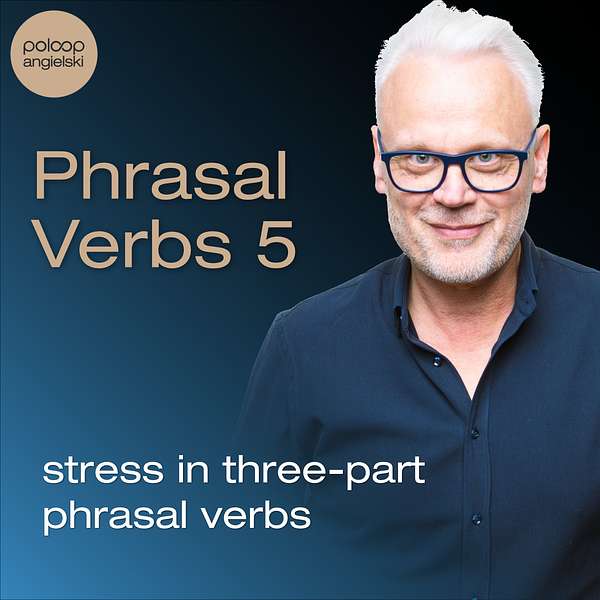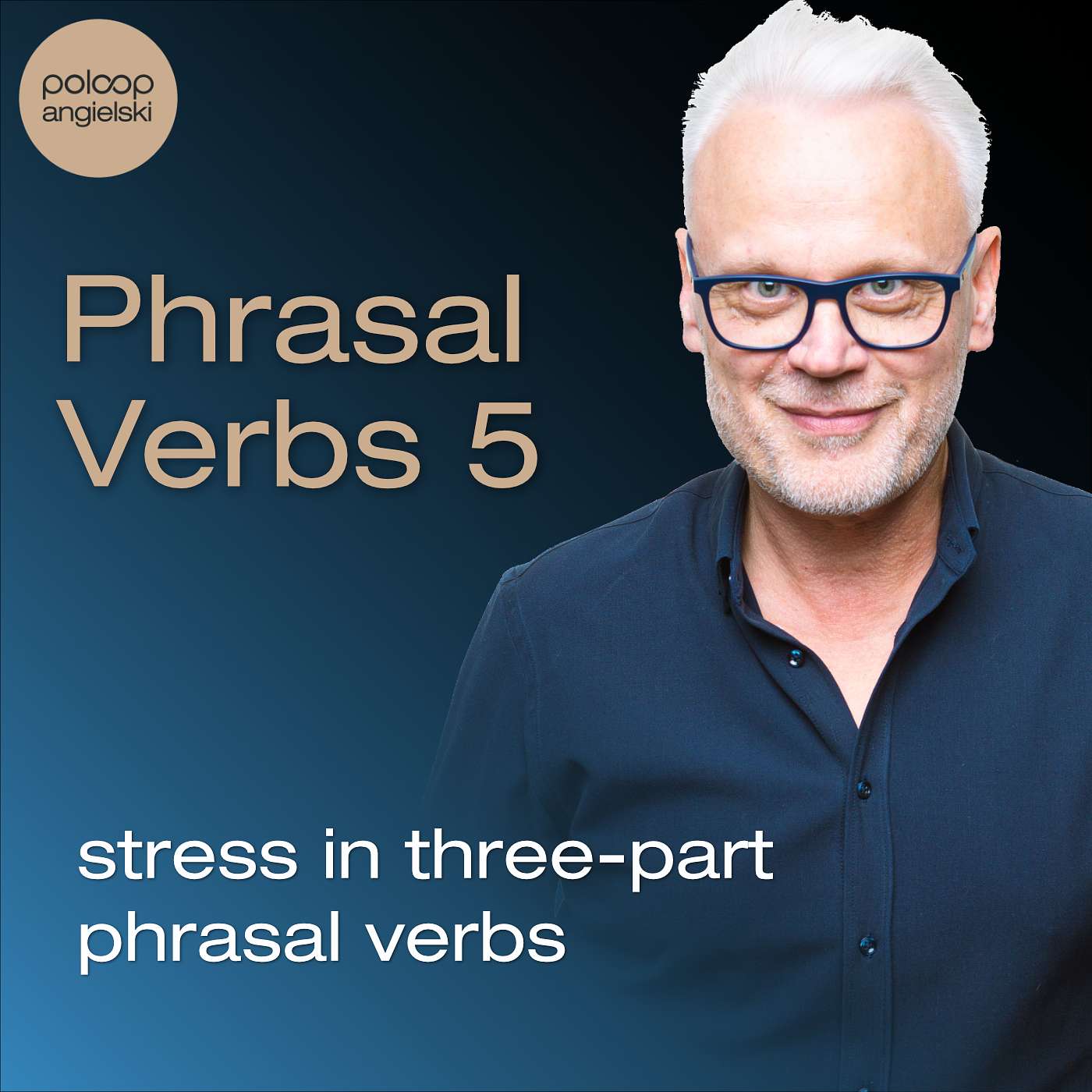
PoLoop Angielski
PoLoop Angielski
Episode 24. Stress in Three-part Phrasal Verbs
This episode is the continuation of the topic of stress in Phrasal Verbs, so it might be a good idea to listen to Episode 23 first.
You can download the complete transcript of this episode here.
Phrasal Verbs used in this recording:
- put sth on: start wearing something
- burn down: get destroyed by fire
- take after sb: look or behave like an older member of the family
- come down with sth: become ill with a disease, usually not serious
- cheat sb out of sth: prevent someone from having something in a dishonest way
- feel up to sth: feel that you are strong or healthy enough to do something
- come up with sth: find or produce an answer, plan, or solution to a problem
- get around to sth: find time and opportunity to do something
- go back on sth: fail to do something that you've promised or agreed to do
- go through with sth: do something that you've planned or agreed to do, especially if it is difficult or unpleasant
- look forward to sth: feel happy and excited about something that is going to happen
- put up with sth: accept something unpleasant or annoying without complaining
- get away with sth: do something wrong and not be properly punished for it
For more, visit: PoLoop Angielski Blog
Drop me a line: jacek@poloopangielski.pl
And join us on social media: Instagram and Facebook
Would you like me to help you master your English? You can find out more about my courses here.
0:01
Hello, I'm Jacek Olender and this is PoLoop Angielski Podcast. For more materials for learners of English and the transcript of this episode, go to my website, poloopangielski.pl.
0:15
Alright, as promised last week, today I'm going to talk about stress in three-part phrasal verbs. But before I get to this, let's do a short recap on what we've learned so far; what we've learned about two-part phrasal verbs and stress. As you might remember, in most instances, what is stressed is a particle, not the verb itself. Unless we have an inseparable, transitive phrasal verb. And what is an inseparable transitive phrasal verb? It's a verb that is followed by an object, and this object can't separate the individual elements of the phrasal verb. Example? "I've fallen for her lies. I've fallen for her lies." When you say you fallen for someone's lies, you've been tricked into believing them. So "fall for something" is an inseparable transitive phrasal verb. It's transitive because it needs an object. If we remove the object, my sentence doesn't make sense. "I fell for ..." We can't stop now, we need to add an object to give this sentence some meaning. In the sentence, "I fell for her lies," the object is "her lies", so "fall for something" is transitive. And it's also inseparable, which means that "her lies" can't be put in the middle of the phrasal verb. I can't say "I fell her lies for" but only "I fell for her lies". The object must come after the phrasal verb. So again, only inseparable, transitive phrasal verbs get the stress on the verbs. Regarding the other two-part phrasal verbs, what we say longer and louder with higher pitch, so what is stressed, is the particle, not the verb.
2:42
So, here comes a short test. I'm going to say three sentences with phrasal verbs, and then I will ask you some questions. Please try to answer them. Okay, sentence number one. "I put on my jacket. I put on my jacket." Is "put on" a transitive or intransitive phrasal verb? Of course, it's transitive because it takes an object, in this case, "my jacket". Is "put on" a separable or inseparable phrasal verb? Separable. Separable because we can say, "I put my jacket on". Does the stress go naturally on "put" or "on" in the sentence? On "on"."I put my jacket on." Okay, sentence two, "The building has burned down." Is "burned down," in this sentence, a transitive or intransitive phrasal verb? It's intransitive; there is no object in this sentence. Does the stress go on the word "burned" or "down"? On "down," the particle, not on the verb. And the final third sentence, "My son takes after me." Is "take after" a transitive verb? Yes, it is. "Me" is the object of the sentence. If the sentence has an object, so the phrasal verb is transitive. Is it separable? It's not. The object "me" must come after the phrasal verb. It cannot go in the middle of the phrasal verb. What is stressed in the sentence? "Take" or "after"? The answer is "take". We say "My son takes after me". All right, so this is the end of the recap if you need more information about transitive and intransitive, separable and inseparable phrasal verbs, or you don't remember very well what we talked about last week, I recommend the previous episode, I recommend listening to it again.
5:38
So now let's move on to three-part phrasal verbs. To remind you, three-part phrasal verbs, or three-word phrasal verbs, as they are sometimes called, consist of, of course, three words, not just two. For example, the sentence "I came down with flu" has a three-part phrasal verb "came down with something". I devoted episode 17 to three-part phrasal verbs, so you might want to come back to it as well. The good news for us today is that the stress pattern of three-part phrasal verbs is generally quite simple. What gets stressed is the second part of the phrasal verb. It doesn't matter whether the phrasal verb is separable or inseparable. That's why we say "I came down with flu" with a stress going on "down" and "She cheated me out of all the money" with the stress going on the particle "out".
6:44
So now let's practise it a little bit. Please repeat after me a few sentences with three-part phrasal verbs, making sure you stress the second part in each of them, and the meanings of all these phrasal verbs as always, you can find in the notes accompanying this episode. So let's start.
I don't feel up to driving. I don't feel up to driving
I think I've come up with a solution. I think I've come up with a solution.
I need to get around to fixing the bathroom door. I need to get around to fixing the bathroom door.
It all boils down to money. It all boils down to money.
I don't get any pleasure out of going to the gym. I don't get any pleasure out of going to the gym.
You can't go back on your promise like that. You can't go back on your promise like that.
Are you really going through with the plan to quit the job? Are you really going through with the plan to quit the job?
I'm looking forward to seeing you in Warsaw. I'm looking forward to seeing you in Warsaw.
How can you put up with it? How can you put up with it
He can get away with murder. He can get away with murder.
8:57
Great. That's it for now. Hope you've learned something new and looking forward to the next episodes. Of course if you can still put up with my ramblings. Next week, I need to come up with something less technical. I think you do deserve a break from phrasal verbs and pronunciation. So, until then, take care. Bye
Transcribed by https://otter.ai




